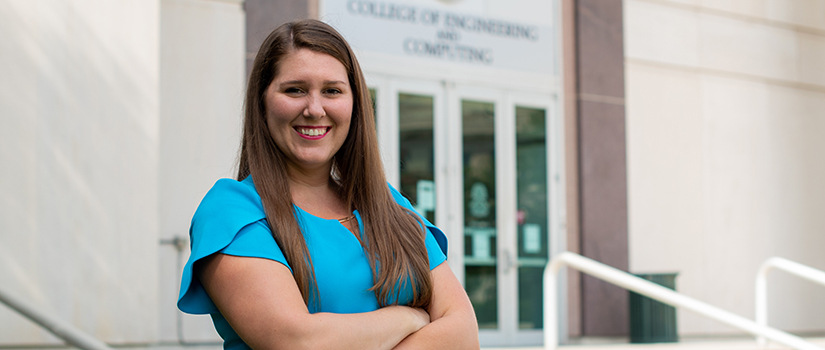How Kristen Booth hopes to provide research excellence and mentorship to the CEC in her first year as a faculty member
By Kaitlyn McCue | September 25, 2020
Having a mentor that you really connect with, someone that can guide you in the right direction and provide valuable insight on possible career paths, is an amazing experience that many people never stop being thankful for Aleck Leedy, however, took mentoring to a whole new level for Kristen Booth.
“His kids were in my wedding,” Booth says about her undergraduate mentor from Murray State University. Even now, an undergraduate degree, master’s, doctorate, and countless research projects later, Booth still calls on Leedy for advice and friendship. He made such an impact in her life that she has made it her personal goal to become a mentor herself for students at the University of South Carolina.
Now, Booth is one of six new faculty hires at the University of South Carolina College of Engineering and Computing, where her research will focus on power electronics and power grid modernization. South Carolina is allowing her to be a part of dynamic interdisciplinary work, combining her academic interests in power systems and artificial intelligence. By joinging the Department of Electrical Engineering, she is working on power system optimization for Navy ships, but she is even more excited about her new research involving AI.
“We can get some pretty cool things to happen,” Booth says, regarding her research on artificial intelligence integration to power electronics. She’ll be looking into how to use AI for active gate driving and is thrilled about the potential applications of this research.
Not only is Booth involved in multi-million-dollar power electronics research and joining the college’s prolific power electronics team, but she is also encouraging rural students to consider pursuing graduate school and even doctoral degrees.
This ambitious goal comes from a personal place, as Booth took on a graduate and doctoral journey herself, as a small-town girl from Milan, Tennessee.
Booth graduated from Murray State University in 2015 before receiving both her master’s and doctoral degrees from North Carolina State University in 2015 and 2019. Then, she went on to Ohio State University to research semiconductor reliability as a post-doctoral researcher.
She credits her success in academia to Leedy, who helped her discover things she could get involved with and find a love for, such as research on solar panels. “I knew I could be an engineer. I was good at math, but I didn’t know how to apply it or where it could take me,” Booth says. But Leedy allowed her to experience real hands-on research in his lab, which gave her the opportunity to discover what she was really capable of, as well as what she loved doing.
Now, while working on the South Carolina Power Electronics team aside Roger Dougal, Herb Ginn and Enrico Santi, she hopes to also mentor the college’s students just as Leedy once mentored her. She has already worked on a blog to engage rural students so they can have the same opportunities she had and is currently developing social media strategies and utilizing Twitter to connect with these students on a personal level.
Through the Power System Design and Analysis (ELCT 551) class she is teaching in the fall semester, Booth is also making sure students in the college know they can reach out to her for anything.
“If I don’t know the answer, or don’t know how to help, hopefully, I know someone who can,” Booth says. It’s her most crucial point in her advice to students: to learn, make connections, and ask questions.
